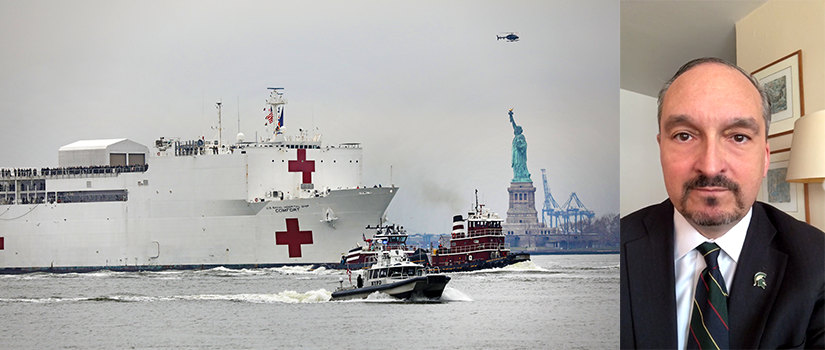JMC Alumnus Reflects on Past Year in New York City Emergency Management
March 29, 2021

Kevin Clark (IR ’87) has worked for the City of New York for over 30 years, with almost 20 of them at New York City Emergency Management (NYCEM).
You’ve worked in New York City’s Office of Emergency Management for some time, but this past year has been like no other. What have been some of the most impact moments for you?
Being assigned to the Javits Center and USNS Comfort Medical Station Command was the career equivalent of walking on the moon for me. Now, a year later, I am working in my neighborhood vaccination center (Yankee Stadium!). Both experiences reflect what I love best about my job: interagency coordination.
Tell us a bit about what your current day-to-day looks like.
Right now, every person in our group has a function to make our Yankee Stadium Mass Vaccination Site run seamlessly for the thousands of Bronx residents receiving Pfizer and Johnson and Johnson vaccines. Yankee Stadium’s Ford and Legends Lounges operated 24/7 for a short period at the beginning of March and up to 2,000 people showed up for appointments all through the night. As a Bronx resident, it was a heartening sight. Our office supported overnight operations by arranging light tower deployments around the stadium and refueling.
The New York Division of Military and Naval Affairs (Army National Guard, Air National Guard, State Guard, and Naval Militia) offer support with physical security, crowd control, ground support, vaccine floor operations, pharmacy support, and as vaccinators. The most difficult function is keeping track of supply for the different syringe and needle combinations that go with each of the two vaccines. We monitor the supply and track it on a daily basis, which gets reported upwards so the site can receive timely and accurate replenishments.
On April 1st Yankee Stadium will open for Opening Day (with around 10,500 fans). We’ll get a break but then go right back into operations on days when there are no games. At the end of the day, there is a tangible sense of satisfaction in seeing people get their vaccinations and start to be able to move on with their lives.
What are some of the more innovative ways your office has responded to the challenges this last year has brought to our communities?
We are a small agency that has done enormous amounts of work for the city during the last year. Everyone in my agency has a similar story about how and where they were assigned. At one pointed I counted 18 separate new initiatives that were stood up for COVID response and recovery purposes. This included many initiatives to support vulnerable populations with food, housing, and transportation alternatives for COVID, plus all the vaccine centers now.
What sort of partnerships (public, private) have been critical to your ability to respond to the emergencies your office has handled?
We are all about coordinating government and private sector functions. It is our biggest strength. Because we work and train with our peers in the regional, state, and federal public safety and governance organizations, those relationships and training allowed us to adapt to many more challenges than we would have been able to otherwise.
What can you tell us about the value of your JMC degree in your current role?
The most valuable lesson I took from my Madison degree is that International Relations all boil down to local resolutions. Coordinating goals and objectives with various local, state, and federal partners is a process that applies universally for diplomacy and other worldly affairs.
Check out the MSU Alumni Office’s piece on Spartans who have risen to the occasion to help combat the coronavirus pandemic, which includes a feature on Kevin, HERE.

